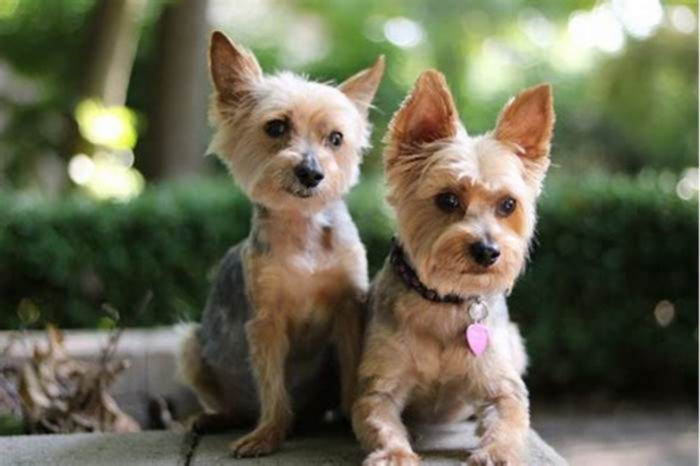Are Yorkies bigger than Chihuahuas

Chihuahua vs Yorkie: Comparing the Charms of These Petite Pooches

Choosing between a Chihuahua and a Yorkie can be a delightful yet challenging decision for any dog lover. These small dogs pack a punch in personality and charm, but how do they differ? This blog aims to unravel the unique traits, care needs, and temperaments of these adorable breeds.
Chihuahuas and Yorkies are renowned for their small size, but dont let that fool you. They have big personalities that make them more than just pets; they become beloved family members. Whether you live in an apartment or a house with a yard, understanding the nuances of each breed is crucial.
In this comparison, well dive into key aspects like health issues, life expectancy, and energy levels. These factors are essential in determining which breed aligns best with your lifestyle and home environment.
So, are you leaning toward the spunky Chihuahua or the elegant Yorkie? By the end of this blog, youll be well-equipped to make an informed decision that best suits your needs and preferences. Lets explore the charming world of these popular breeds together!
Understanding the Basics
Before diving into the detailed comparison, lets get acquainted with the fundamental characteristics of Chihuahuas and Yorkies. These small dog breeds are not just about their adorable looks; they have distinct histories, appearances, and traits that set them apart.
Chihuahua and Yorkie Overview
- Chihuahua: Originating from Mexico, the Chihuahua is known for its tiny size and bold nature. They are among the smallest dog breeds, often weighing no more than 6 pounds. Chihuahuas come in two varieties: the short haired and the long haired Chihuahua, each with its own grooming needs. Despite their size, they have a big personality, often being alert and lively.
- Yorkie: The Yorkshire Terrier, fondly known as the Yorkie, hails from England and was initially bred for catching rats in mills. Today, they are more recognized for their luxurious silky coat and elegant appearance. Yorkies are also small, typically under 7 pounds, but are known for their adventurous and affectionate nature.
Key Differences
While both breeds share the charm of being small dogs, there are noticeable differences:
- Appearance: Chihuahuas have a distinct apple-shaped head and erect ears, contrasting with Yorkies small, flat head and V-shaped ears. The Yorkies coat is its most striking feature, being long and fine, whereas Chihuahuas have a more varied coat in terms of length and texture.
- Personality: Chihuahuas are known for their loyalty and can be very attached to a single person, making them excellent companion dogs. Yorkies, while also loyal, tend to be more outgoing and sociable, often getting along well with young children and other pets.
By understanding these basic differences, you can start to gauge which breed might be a better fit for your lifestyle and preferences. Both breeds, with their unique qualities, offer a special kind of companionship thats cherished by dog lovers worldwide.

Considering Health and Longevity
When it comes to choosing a pet, their health and lifespan are critical factors. Both Chihuahuas and Yorkies, like all breeds, have specific health concerns and life expectancies that potential owners should be aware of. This knowledge ensures youre prepared to provide the special care they need.
Common Health Issues
Both Chihuahua and Yorkie breeds are prone to certain health issues, which is an important consideration for anyone looking to welcome these small dogs into their family.
- Chihuahua: This breed can be susceptible to health problems like patellar luxation (a knee condition) and dental problems due to their small mouths. They are also prone to heart issues and can be sensitive to cold weather, requiring extra care during colder months.
- Yorkie: Yorkies share some of the same concerns as Chihuahuas, including patellar luxation. They are also prone to hip dysplasia, a condition affecting the hip joint, and can have sensitive digestive systems. Their fine, silky coat requires regular grooming to prevent matting and skin issues.
Life Expectancy
Understanding the typical lifespan of these breeds can help you plan for a long and happy life together.
- Chihuahua: They are known for their longevity, often living up to 15 years or more, making them a long-time companion.
- Yorkie: Similarly, Yorkies have a long life expectancy, often living between 12 to 15 years. Their lifespan can be maximized with good care, including a diet of high-quality dog food and regular veterinary check-ups.
Special Care Needs
Caring for small breeds like Chihuahuas and Yorkies also involves understanding their unique needs in terms of exercise, diet, and environment.
- Exercise Needs: Despite their small size, both breeds require regular exercise. Chihuahuas benefit from short walks and playtime, while Yorkies might need slightly more physical activity due to their higher energy levels.
- Dietary Considerations: A balanced diet tailored to small breeds is crucial. Both require high-quality dog food to maintain their health and energy. Special attention should be given to portion control to prevent obesity, a common issue in small breeds.
- Environmental Factors: Both breeds can be sensitive to extreme weather conditions. Chihuahuas may need extra warmth in cold temperatures, while Yorkies, with their long coats, might need protection from excessive heat.
By considering these health and care aspects, you can ensure that your Chihuahua or Yorkie remains in good condition and enjoys a longer lifespan. Remember, regular vet check-ups and a loving home environment are key to keeping these affectionate dogs healthy and happy.

Temperament and Personality
Understanding the temperament and personality of Chihuahuas and Yorkies is essential for determining which breed is the right fit for your home and lifestyle. Both breeds have distinct personalities that cater to different types of owners and living situations, making it important to consider their behavioral traits.
Energy Level and Playfulness
The energy levels and playfulness of these breeds vary, impacting how they interact with their family and surroundings.
- Chihuahua: Known for their vivacious and bold nature, Chihuahuas possess a surprisingly high energy level for their size. They are playful and enjoy engaging in activities but can also be quite content with being lap dogs. This makes them a good choice for both active individuals and those who prefer a more laid-back lifestyle.
- Yorkie: Yorkies are also energetic and love to play. They thrive in environments where they can explore and engage in activities. Their playful nature makes them great companions for families with young children or older children who can participate in their care and playtime.
Suitability as a Family Member
Both breeds can be wonderful additions to a family, but their suitability may depend on your familys dynamics and lifestyle.
- Chihuahua: Chihuahuas often bond closely with a single person, making them ideal for single people or families where they can become a special companion to one member. They can be cautious around small children, so families with very young kids should supervise interactions.
- Yorkie: Yorkies are generally sociable and can adapt well to families. They are affectionate and enjoy being part of family activities. Their sociable nature also makes them more adaptable to homes with other pets, including small breeds and even larger dogs.
Interaction with Other Pets
How these breeds interact with other animals is another aspect to consider, especially for households with multiple pets.
- Chihuahua: While they can coexist with other pets, Chihuahuas may need time to adjust and can be territorial. Early socialization is key for them to get along with other animals, including toy breeds and companion dogs.
- Yorkie: Yorkies can be more open to living with other pets. However, their playful nature should be balanced with proper training and socialization, especially if they are to interact with toy poodle, shih tzu, or other small dog breeds.
In summary, while Chihuahuas and Yorkies both make excellent pets, their distinct personalities and temperaments mean that they may be better suited to different types of owners and living environments. Understanding these traits will help you decide which breed is the best dog for you and your family.

Maintenance and Care
Proper maintenance and care are pivotal for the health and happiness of any pet. Chihuahuas and Yorkies, with their unique needs, require specific attention in terms of grooming, diet, and exercise. This section will help you understand what it takes to keep these small dogs in top condition.
Grooming Needs
The grooming requirements of Chihuahuas and Yorkies are quite distinct due to their different coat types.
- Chihuahua: Chihuahuas come in two varieties: short-haired and long-haired. Short-haired Chihuahuas require minimal grooming, mainly regular brushing to remove loose hair. On the other hand, long-haired Chihuahuas need more frequent brushing to prevent tangles and mats, emphasizing the importance of regular grooming.
- Yorkie: Yorkies are known for their beautiful, fine silky coat that requires daily brushing to stay free of knots. They also benefit from regular professional grooming to keep their coat trimmed and in good condition. This breed can be more high-maintenance in terms of grooming needs, compared to Chihuahuas.
Exercise and Training
Despite their small size, both breeds need regular exercise and proper training.
- Chihuahua: These dogs are generally less demanding in terms of exercise need. Short walks and play sessions are usually sufficient to keep them healthy and happy. However, they do require consistent training, especially for socialization, as they can be wary of strangers and other animals.
- Yorkie: Yorkies have a higher energy level and may need more physical activity. They enjoy walks and playtime and can be quite adventurous. Training is crucial for Yorkies, particularly in terms of obedience and socialization, and techniques like positive reinforcement work well.
Dietary Needs
A balanced diet is crucial for both breeds, considering their small size and energy requirements.
- Chihuahua: They require a diet that is rich in nutrients and appropriate for their size. Its important to monitor their food intake to prevent obesity, a common issue in small breeds like the Chihuahua.
- Yorkie: Yorkies also need a nutrient-rich diet, preferably with smaller kibble sizes suited for their tiny mouths. Like Chihuahuas, they should be fed in controlled portions to maintain a healthy weight.
In essence, while both Chihuahuas and Yorkies are small breeds, their maintenance and care needs differ significantly. Understanding and catering to these needs will ensure your small pet remains in good condition, enjoying a longer lifespan and a better quality of life.

Living with a Chihuahua or Yorkie
Integrating a Chihuahua or Yorkie into your home involves more than just meeting their physical needs; its about creating an environment that suits their unique personalities and preferences. This section will help you understand what life with these charming breeds entails, ensuring a harmonious coexistence.
Adapting to Environments
Both breeds have specific environmental needs and preferences, influenced by factors like weather and living space.
- Chihuahua: These dogs can be sensitive to cold weather, so providing them with a warm environment is essential. They are well-suited for apartment living due to their small size, but they also enjoy having access to a safe, enclosed outdoor space.
- Yorkie: Yorkies, with their long coat, can handle cooler temperatures better but may struggle in hot weather. They also adapt well to apartment living and enjoy having space to play and explore. Regardless of living space, both breeds benefit from a stable and loving home environment.
The Ideal Home Setting
The right home setting can significantly impact the well-being and happiness of these breeds.
- Chihuahua: They thrive in a home where they can receive plenty of attention and love. Chihuahuas are ideal for single people or families with older children who understand the need for gentle handling due to their small stature.
- Yorkie: Yorkies are more adaptable to various home settings, including families with young children and small children. However, supervision is important to ensure safe interactions, especially given the Yorkies small size and delicate structure.
Interaction with the Community
How these breeds interact with the outside world and community is another aspect to consider.
- Chihuahua: They can be cautious or even territorial around strangers and other animals. Early socialization and consistent training can help them become more comfortable in different settings, including walks in public places and visits to the vet.
- Yorkie: Yorkies tend to be more sociable and can enjoy outings and social interactions. However, their adventurous spirit means they should always be monitored, especially in open or unfamiliar environments.
By understanding and accommodating the specific needs of Chihuahuas and Yorkies, you can create a nurturing and supportive environment for them. Whether its a cozy corner in an apartment for a Chihuahua or an active play area for a Yorkie, tailoring your home to suit their preferences will ensure they feel loved and contented.
Remember, the key to a successful companionship with these affectionate dogs is not just in meeting their physical needs but also in understanding and respecting their unique personalities and behaviors.

Choosing the Right Breed for You
Selecting between a Chihuahua and a Yorkie is a decision that should align with your lifestyle, living situation, and personal preferences. This final section will guide you through considering various factors to determine which breed is the best fit for you and your home.
Assessing Your Lifestyle
Your daily routine and lifestyle are crucial in deciding which breed will integrate seamlessly into your life.
- Activity Level: Consider your activity level. If you lead a more active lifestyle, a Yorkie, with its higher energy level, might be a better match. For those with a more relaxed lifestyle, a Chihuahuas laid-back nature could be ideal.
- Home Environment: Evaluate your living space. Both breeds can adapt to apartment living, but Yorkies might require more space for exercise. Chihuahuas can fit comfortably in smaller spaces and are less demanding in terms of physical activity.
- Time Commitment: Reflect on the time you can dedicate to your pet. Yorkies, requiring regular grooming and more daily walks, might need more time commitment compared to Chihuahuas.
Finding a Reputable Breeder
If youve decided which breed is right for you, the next step is to find a reputable breeder. This is essential to ensure you get a healthy, well-socialized puppy.
- Research: Look for breeders who are affiliated with organizations like the American Kennel Club. They should have a good track record and be willing to provide health clearances for the puppies.
- Visit: If possible, visit the breeder to see the conditions in which the puppies are raised. This gives you an insight into their early life and care.
- Questions: Ask questions about the parent breeds, litter size, and the specific needs of the breed. A reputable breeder will be knowledgeable and transparent.
In conclusion, choosing between a Chihuahua and a Yorkie is a decision that depends on various factors, including your lifestyle, environment, and the amount of time you can dedicate to pet care.
By considering these aspects and selecting a reputable breeder, you can ensure that the dog you bring into your home is a perfect match for you and will be a cherished family member for years to come.

Conclusion: Chihuahua vs Yorkie
As we wrap up our exploration of Chihuahuas and Yorkies, its clear that both breeds offer their own unique charm and characteristics. Whether its the spirited and loyal Chihuahua or the adventurous and affectionate Yorkie, each breed brings a special kind of joy and companionship to their owners. The decision between a Chihuahua and a Yorkie ultimately depends on your personal lifestyle, preferences, and what youre looking for in a furry companion.
Remember, both breeds require commitment in terms of care, attention, and love. Chihuahuas may be better suited for those seeking a less active but loyal pet, while Yorkies can be the perfect match for families or individuals looking for a more energetic and sociable dog. Regardless of your choice, both breeds are sure to provide endless affection, entertainment, and companionship.
Choosing the right dog is an important decision that should be made with care and consideration. We hope this blog has provided valuable insights to help you make an informed choice between these two beloved small dog breeds. Whichever breed you choose, youre bound to have a loving and devoted family member for years to come.
FAQ Section
- Are either of these breeds good watchdogs? Despite their small size, both Chihuahuas and Yorkies can be alert and vocal, making them decent watchdogs in their own right.
- How do these breeds interact with larger dogs? With proper socialization, both Chihuahuas and Yorkies can get along with larger dogs, though care should be taken due to their small size.
- What special care might a Chihuahua Yorkie mix need? A Chihuahua Yorkie mix, or Chorkie, may inherit traits from both parent breeds, requiring a balance of care, including grooming, exercise, and health monitoring.
- Can these breeds be trained for much exercise? Yorkies may enjoy more vigorous exercise, but both breeds dont require intense physical activity. Regular, moderate exercise is sufficient.
- How do Chihuahuas and Yorkies fare in different weather conditions? Chihuahuas are sensitive to cold, while Yorkies can handle cooler temperatures but may struggle in heat. Both breeds need protection from extreme weather.
- Can Chihuahuas and Yorkies breed with each other? Yes, Chihuahuas and Yorkies can breed together to produce a mixed breed known as the Chorkie. These hybrids inherit traits from both parent breeds, resulting in a unique combination of characteristics. Its important to note that breeding should be done responsibly and with consideration for the health and well-being of both the parent breeds and the offspring.









